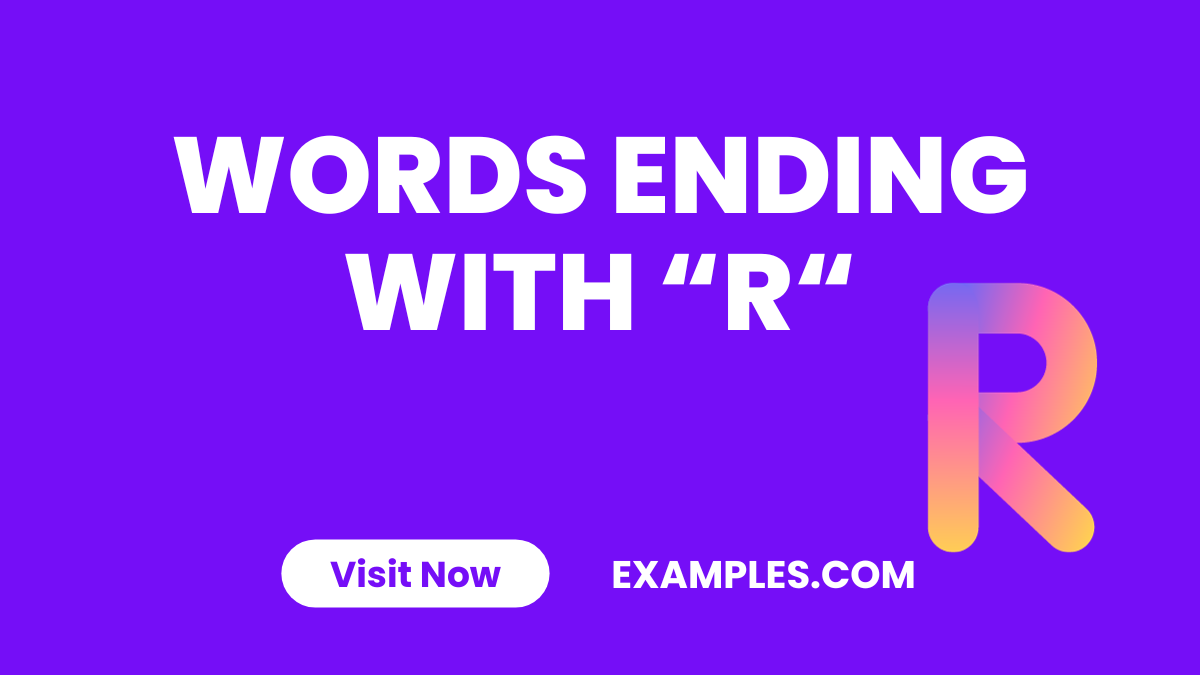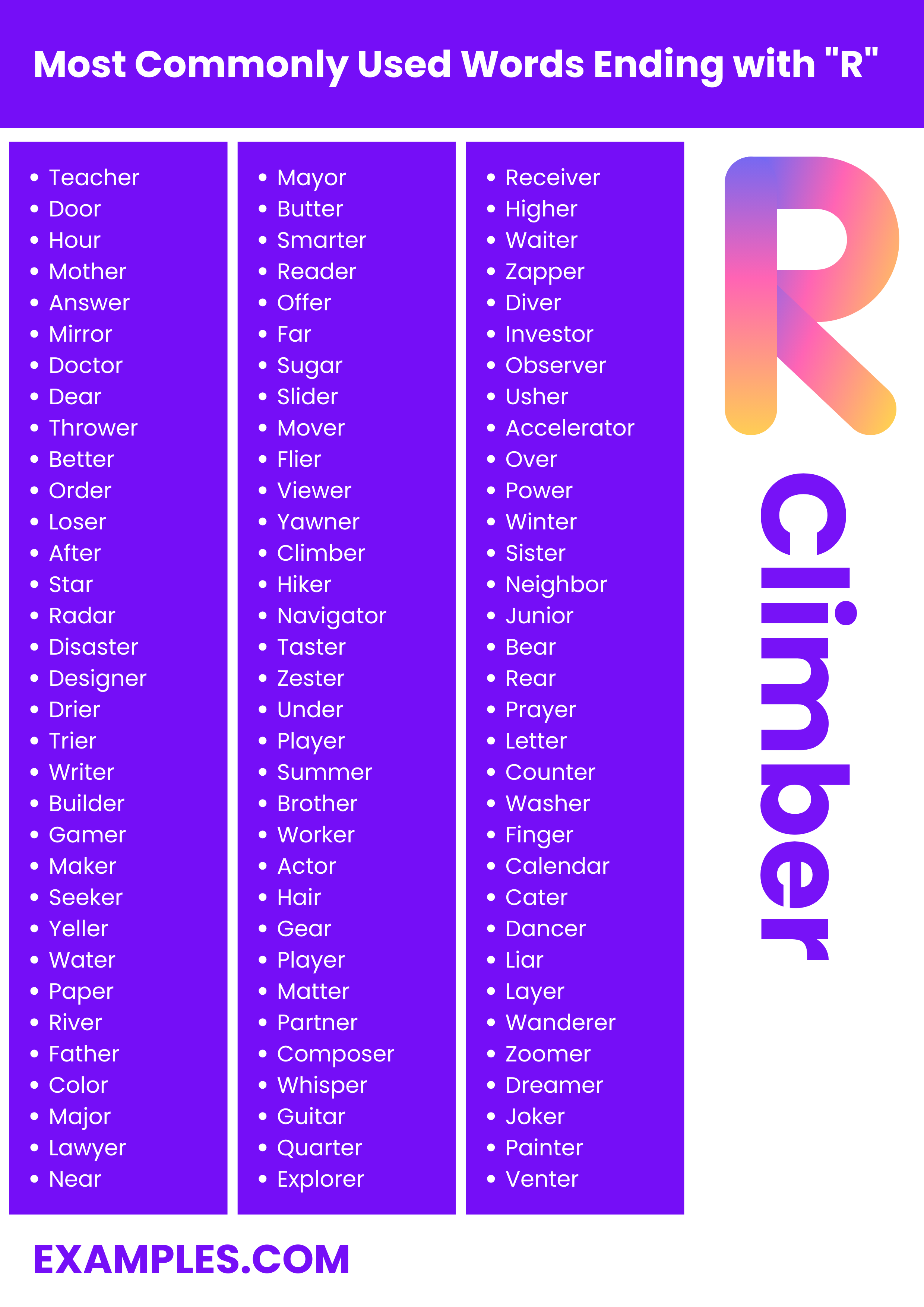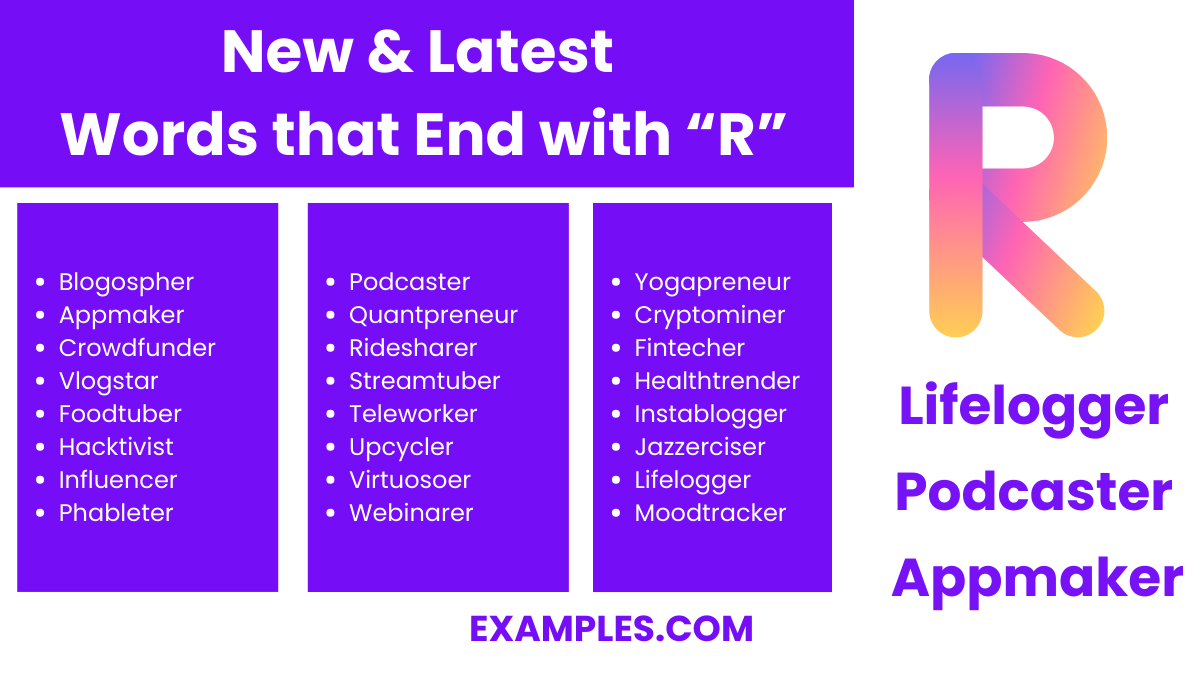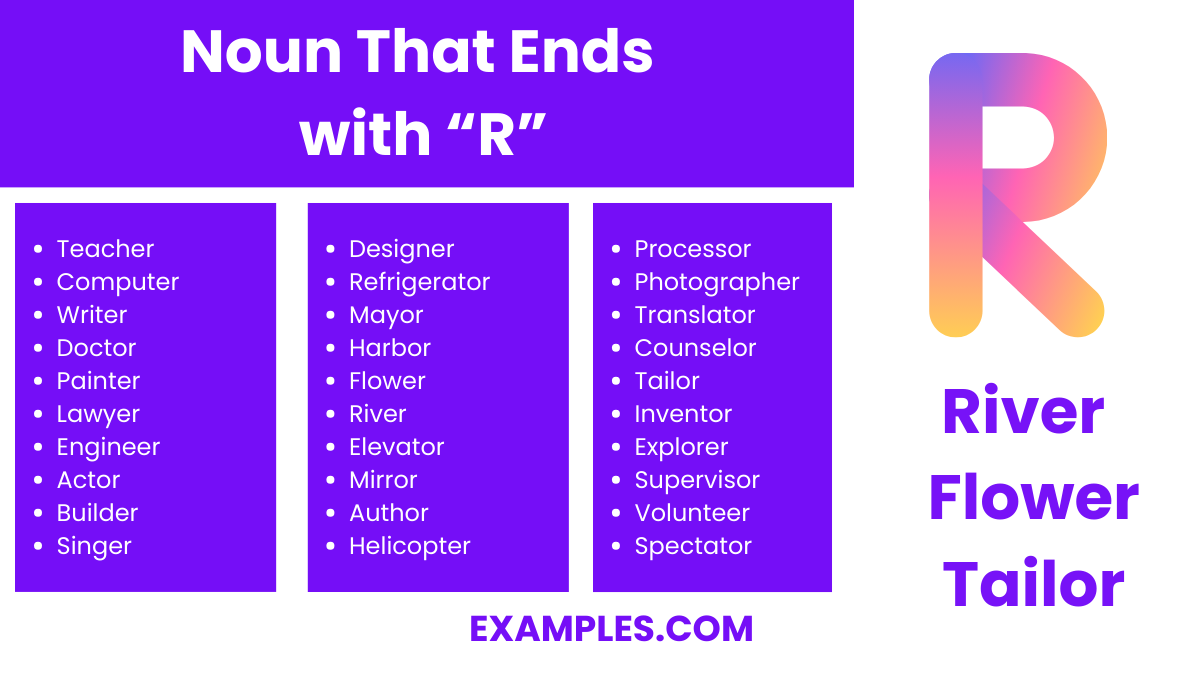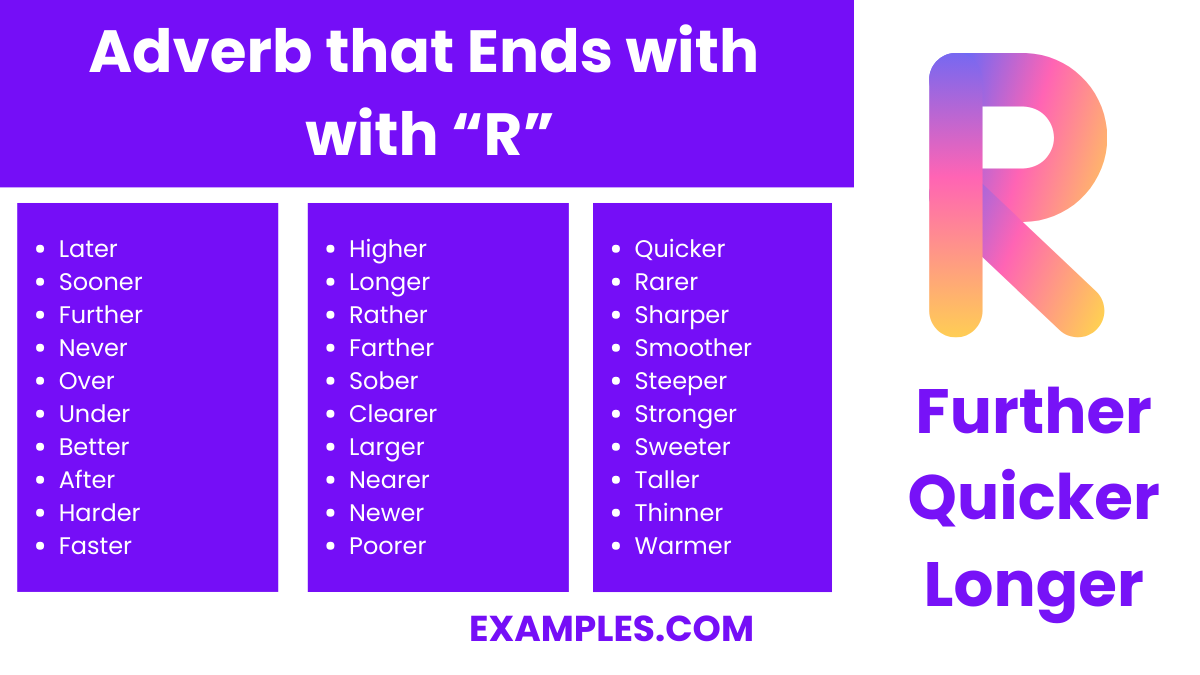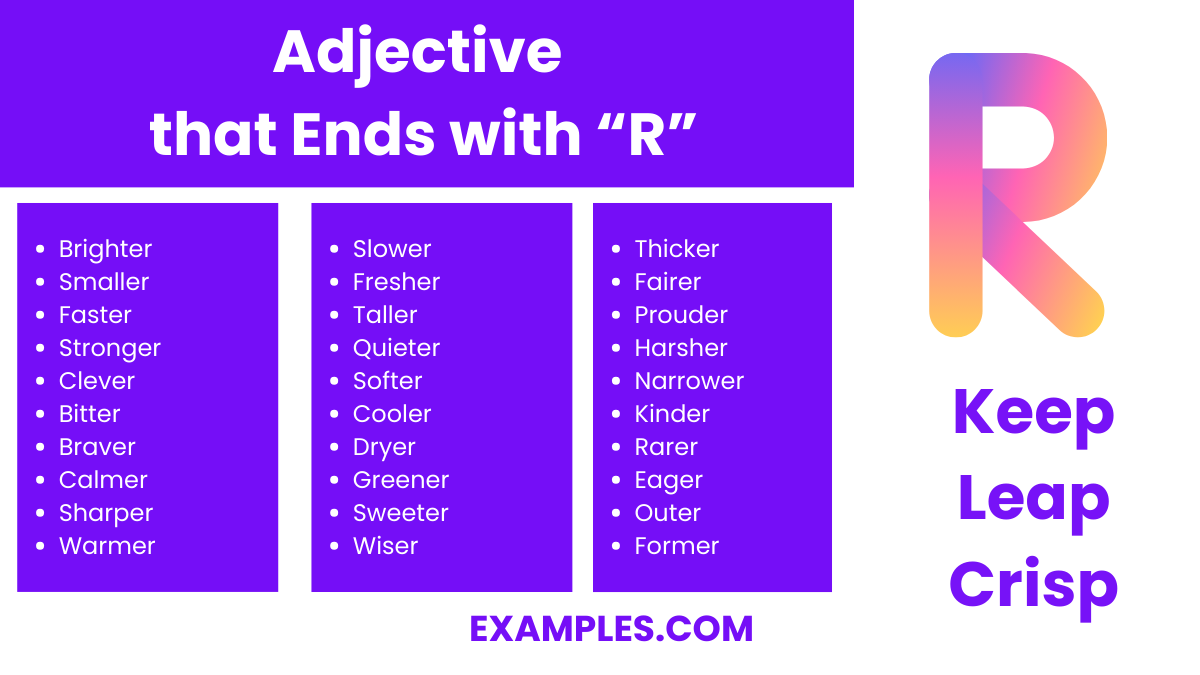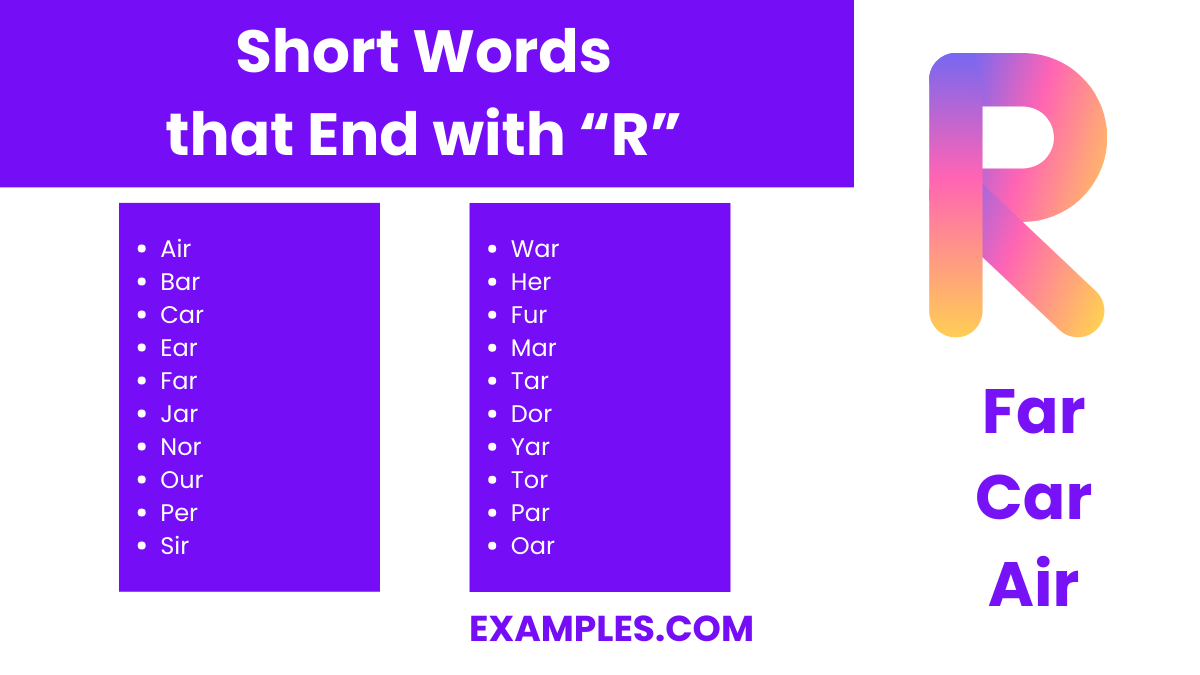150+ Words Ending With R List, Meaning, PDF
Words that ending with ‘R’ opens up a fascinating segment of the English language, offering a unique lens through which educators can enrich their vocabulary teachings. These ‘R’ words ending span a wide spectrum, from action-driven verbs like “shiver” to descriptive adjectives such as “clear,” enhancing both the depth and breadth of language comprehension. For teachers, this array presents a golden opportunity to introduce students to a variety of contexts and usages, from scientific terms to everyday language. Incorporating these words into lessons through storytelling, writing exercises, and interactive discussions can significantly boost students’ linguistic capabilities, making their communication more nuanced and effective. This exploration not only aids in vocabulary expansion but also fosters a deeper engagement with the intricacies of English.
Download Most Commonly Used Words Ending with R - PDF
150 Most Commonly Used Words Ending with “R”
In the realm of English vocabulary, words ending with the letter ‘R’ hold significant importance. They encompass a wide range of meanings, serving various grammatical roles including nouns, verbs, adjectives, and more. This vast collection of ‘R’-ending words is crucial for educators and students alike, enhancing both teaching methodologies and learning experiences. Understanding these words can significantly improve language skills, aiding in effective communication and comprehension. For teachers, these words are tools for designing more engaging and informative lessons. In this article, we present a comprehensive table of 150 commonly used words ending with ‘R,’ carefully categorized to aid teachers in their educational endeavors.
| Teacher | Water | Under | Over | Computer | Car |
| Door | Paper | Player | Power | Flower | Chair |
| Hour | River | Summer | Winter | Supporter | Follower |
| Mother | Father | Brother | Sister | Other | Later |
| Answer | Color | Worker | Neighbor | Greater | Conqueror |
| Mirror | Major | Actor | Junior | Senior | Visitor |
| Doctor | Lawyer | Hair | Bear | Fear | Clear |
| Dear | Near | Gear | Rear | Career | Year |
| Thrower | Mayor | Player | Prayer | Roar | War |
| Better | Butter | Matter | Letter | Center | Motor |
| Order | Smarter | Partner | Counter | Dinner | Winner |
| Loser | Reader | Composer | Washer | Leader | Transformer |
| After | Offer | Whisper | Finger | Anger | Danger |
| Star | Far | Guitar | Calendar | Lunar | Solar |
| Radar | Sugar | Quarter | Cater | Master | Faster |
| Disaster | Slider | Explorer | Dancer | Charger | Stranger |
| Designer | Mover | Receiver | Liar | Buyer | Crier |
| Drier | Flier | Higher | Layer | Payer | Sayer |
| Trier | Viewer | Waiter | Wanderer | Whisperer | Worshipper |
| Writer | Yawner | Zapper | Zoomer | Advisor | Beggar |
| Builder | Climber | Diver | Dreamer | Eater | Fighter |
| Gamer | Hiker | Investor | Joker | Keeper | Learner |
| Maker | Navigator | Observer | Painter | Quoter | Runner |
| Seeker | Taster | Usher | Venter | Watcher | Xylophoner |
| Yeller | Zester | Accelerator | Balancer | Converter | Debugger |
Most Trending Words that End with “R”
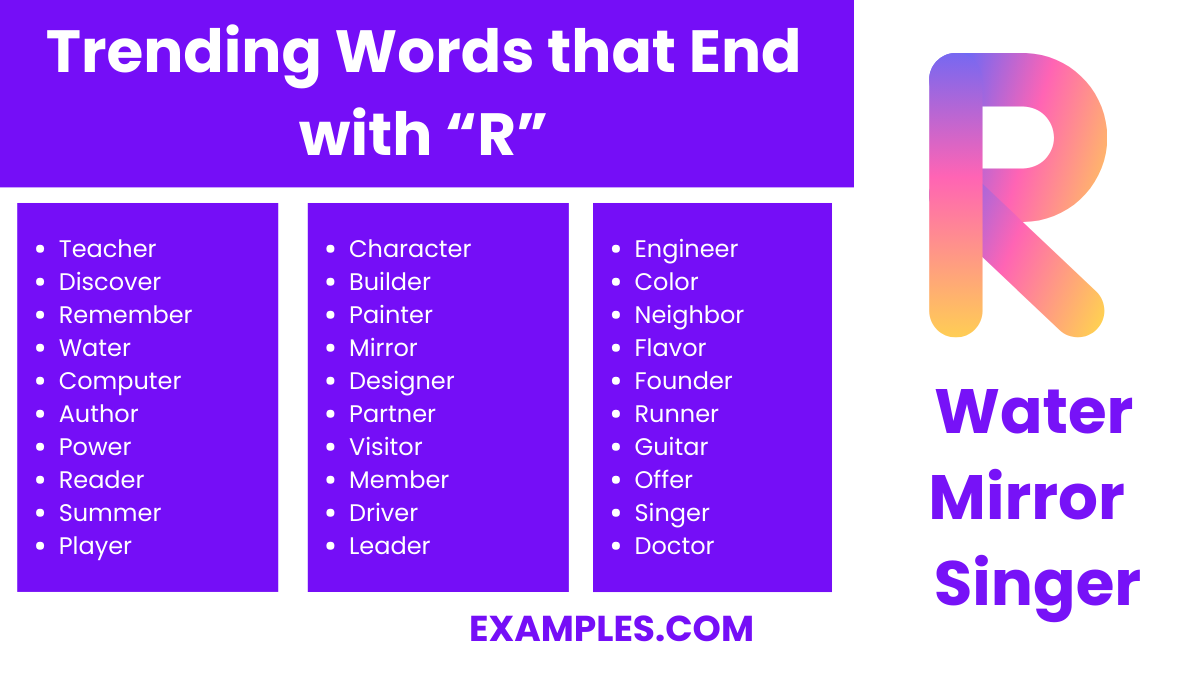
The English vocabulary is rich with words ending in ‘R’, a letter that lends a distinctive resonance to the language. These words pervade various linguistic landscapes, from the poetic allure of Rhyming Words to the practical realm of Daily Use English Words, underscoring their ubiquity and relevance. Educators, by integrating these ‘R’-ending words into their repertoire, can significantly enhance the teaching and learning experience, offering students a more comprehensive grasp of English. Such words not only enrich one’s vocabulary but also sharpen linguistic acuity, facilitating more nuanced and effective communication. This resource proves invaluable for teachers striving to enrich their instructional methods and for students seeking to broaden their verbal and written expression.
- Teacher – A person who instructs or educates others.
- Discover – To find or uncover something new or unexplored.
- Remember – To recall or bring back to mind a memory.
- Water – A transparent, odorless, and tasteless liquid essential for life.
- Computer – An electronic device for storing and processing data.
- Author – A writer of a book, article, or report.
- Power – The capacity to influence or direct behavior or events.
- Reader – A person who reads or examines text.
- Summer – The warmest season of the year.
- Player – A person taking part in a game or sport.
- Character – A person in a novel, play, or movie.
- Builder – Someone who constructs or repairs buildings.
- Painter – An artist who paints pictures.
- Mirror – A reflective surface, typically glass coated with a metal amalgam.
- Designer – A person who plans the look or workings of something.
- Partner – A person who takes part in an endeavor with another.
- Visitor – A person visiting someone or somewhere.
- Member – A person belonging to a group or organization.
- Driver – A person who operates a vehicle.
- Leader – A person who leads or commands a group.
- Engineer – A professional in engineering, involved in design, building, or maintenance.
- Color – The property possessed by an object of producing different sensations on the eye.
- Neighbor – A person living near or next door.
- Flavor – The distinctive taste of food or drink.
- Founder – A person who establishes an institution or settlement.
- Runner – A person or animal that runs, especially as a form of exercise or in competitions.
- Guitar – A stringed musical instrument played with the fingers or a plectrum.
- Offer – To present or proffer something for acceptance.
- Singer – A person who sings, especially professionally.
- Doctor – A qualified practitioner of medicine; a physician.
New & Latest Added Words that End with “R”
The dynamic nature of the English language, with its continual introduction of new words, mirrors the pulse of evolving societal trends, technological innovations, and cultural changes. For educators and linguaphiles, staying attuned to these linguistic developments is crucial. This ongoing enrichment of the lexicon not only broadens one’s vocabulary but also forges a connection between classical language foundations and modern vernacular. These fresh additions, spanning from cutting-edge tech terminologies to everyday slang, are indispensable for teachers committed to delivering contemporary and resonant language education. Emphasizing the understanding of singular & plural words enhances grammatical accuracy, while exploring Compound Words deepens insights into word formation, making this pursuit essential for those dedicated to fostering a comprehensive and current linguistic skill set in students.
- Blogospher – Referring to the collective world of blogs.
- Appmaker – Someone who develops applications, especially for mobile devices.
- Crowdfunder – A person or entity that funds projects through crowdsourcing.
- Vlogstar – A person who is famous for creating video blogs.
- Eco-warrior – An individual advocating for environmental protection.
- Foodtuber – A YouTuber specializing in creating food-related content.
- Hacktivist – A person who uses hacking skills for political or social activism.
- Influencer – A person with the ability to influence potential buyers of products or services by promoting or recommending the items on social media.
- Phableter – A device combining the features of a smartphone and a tablet.
- Podcaster – A person who creates and broadcasts podcasts.
- Quantpreneur – An entrepreneur involved in quantitative finance.
- Ridesharer – A person who participates in ride-sharing.
- Streamtuber – A person who streams video content, particularly on YouTube.
- Teleworker – A person who works remotely, often from home.
- Upcycler – Someone who reuses (discarded objects or material) in such a way as to create a product of higher quality or value than the original.
- Virtuosoer – A person highly skilled in music or another artistic pursuit, especially with a contemporary twist.
- Webinarer – A person who attends or conducts webinars.
- Yogapreneur – An entrepreneur in the field of yoga.
- Cryptominer – A person who mines cryptocurrency.
- E-shopper – A person who shops online.
- Fintecher – A professional in the field of financial technology.
- Healthtrender – An individual who is particularly influential in the field of health trends.
- Instablogger – A blogger who primarily uses Instagram.
- Jazzerciser – A person who participates in jazzercise fitness activities.
- Lifelogger – A person who records aspects of their everyday life.
- Moodtracker – An application or device used for tracking one’s mood.
Noun That Ends with “R”
Teaching English unveils the richness of noun words, particularly those concluding with ‘R’, offering a broad spectrum for enhancing students’ vocabulary. These nouns, encompassing everyday items to specialized terminology, are pivotal in language development. For educators striving to expand their students’ linguistic capabilities, mastering these nouns is invaluable. This compilation of 30 nouns ending in ‘R’, each detailed with its definition, stands as a comprehensive aid for teachers. Including Ness Words delves into qualities and conditions, while Pictionary Words adds a creative dimension, making this collection a versatile tool in educational settings.
- Teacher – A person who educates others.
- Computer – An electronic device for storing and processing data.
- Writer – Someone who writes books, stories, or articles.
- Doctor – A qualified practitioner of medicine.
- Painter – An artist who paints pictures.
- Lawyer – A professional practicing or studying law.
- Engineer – A person who designs, builds, or maintains engines, machines, or structures.
- Actor – A person whose profession is performing in plays, movies, or television productions.
- Builder – A person who constructs something by putting parts together.
- Singer – A person who sings, especially professionally.
- Designer – A person who plans the look or workings of something prior to it being made.
- Refrigerator – An appliance for keeping food and drinks cold.
- Mayor – The elected head of a city, town, or other municipality.
- Harbor – A place on the coast where ships may moor in shelter.
- Flower – The reproductive structure found in flowering plants.
- River – A large natural stream of water flowing in a channel to the sea, a lake, or another river.
- Elevator – A platform or compartment housed in a shaft for raising and lowering people or things to different floors or levels.
- Mirror – A reflective surface, now typically of glass coated with a metal amalgam, that reflects a clear image.
- Author – A writer of a book, article, or report.
- Helicopter – A type of aircraft that derives both lift and propulsion from one or two sets of horizontally revolving rotors.
- Processor – A machine or person that processes something.
- Photographer – A person who takes photographs, especially as a job.
- Translator – A person who translates from one language into another.
- Counselor – A person trained to give guidance on personal, social, or psychological problems.
- Tailor – A person whose occupation is making fitted clothes.
- Inventor – A person who invented a particular process or device or who invents things as an occupation.
- Explorer – A person who explores a new or unfamiliar area.
- Supervisor – A person who supervises a person or an activity.
- Volunteer – A person who freely offers to take part in an enterprise or undertake a task.
- Spectator – A person who watches at a show, game, or other event.
Adverb That End with “R”
In English, adverbs words play a crucial role in adding depth and clarity to sentences. Among these, adverbs ending with ‘R’ are particularly interesting, offering a unique twist in expression. These words, ranging from common to rare, enrich our language with nuances and specificity. Teachers and educators seeking to enhance their students’ understanding of adverbs will find this list of 30 adverbs ending in ‘R’ extremely useful. Each word is not only a tool for effective communication but also a window into the dynamic nature of English. Let’s explore these words and their meanings to broaden our linguistic horizons.
- Later – At a time subsequent to a reference time.
- Sooner – In or after a short time.
- Further – At or to a more advanced point; to a greater extent.
- Never – At no time in the past or future.
- Over – Above in place or position.
- Under – Beneath or below.
- Better – In a more excellent manner.
- After – In the time following.
- Harder – With more effort or force.
- Faster – At high speed.
- Higher – At a great vertical extent.
- Longer – For an extended time.
- Rather – Preferably or instead.
- Farther – At a greater distance.
- Sober – Not affected by alcohol; serious.
- Clearer – In a way that is easy to understand.
- Larger – To a greater size.
- Nearer – At a smaller distance.
- Newer – More recently.
- Poorer – With less wealth or lower quality.
- Quicker – At a faster rate.
- Rarer – Less frequently occurring.
- Sharper – With a fine or keen edge.
- Smoother – In a more even way.
- Steeper – At a more acute angle.
- Stronger – With greater strength.
- Sweeter – With a more pleasant taste.
- Taller – Of greater height.
- Thinner – With smaller thickness.
- Warmer – With more heat.
Adjective That Ends with “R”
Adjectives ending in ‘R’ enrich the English language, offering nuanced descriptions that range from physical attributes to emotional states. For educators keen on broadening their students’ expressive abilities, these adjectives are invaluable. They enhance creative writing and everyday communication, enabling students to articulate their thoughts with greater precision and color. This selection of 30 adjectives ending with ‘R’ is designed to deepen our appreciation of these linguistic elements, expanding both vocabulary and expressive capacity. Incorporating Praising Words fosters a positive learning environment, while focusing on Vowel Words emphasizes phonetic diversity, making this exploration a comprehensive tool for linguistic enhancement.
- Brighter – More luminous or intelligent.
- Smaller – Lesser in size, amount, or degree.
- Faster – Moving at high speed or quick in action.
- Stronger – Having great physical power or durability.
- Clever – Quick to understand or learn.
- Bitter – Having a sharp, pungent taste or showing resentment.
- Braver – More courageous or bold.
- Calmer – More peaceful, quiet, or tranquil.
- Sharper – Having an acute edge or intellect.
- Warmer – More cozy or affectionate.
- Slower – Moving at a reduced speed or less intelligent.
- Fresher – More recently made or obtained; newer.
- Taller – Having greater height.
- Quieter – Making less noise or more reserved.
- Softer – Easier to mold, cut, compress, or fold.
- Cooler – Moderately cold or unfriendly.
- Dryer – Free from moisture or unemotional.
- Greener – More environmentally conscious or inexperienced.
- Sweeter – Having a pleasant taste or disposition.
- Wiser – Having knowledge, experience, and good judgment.
- Thicker – Having a larger distance between opposite sides.
- Fairer – More just, equitable, or beautiful.
- Prouder – Feeling deep pleasure or satisfaction.
- Harsher – Unpleasantly rough or jarring to the senses.
- Narrower – Less wide or limited in extent.
- Kinder – More caring or warm-hearted.
- Rarer – Less common or frequent.
- Eager – Keenly interested or enthusiastic.
- Outer – Located on the outside or further from a center.
- Former – Having previously filled a particular role.
Phrasal Verbs That End with “R”
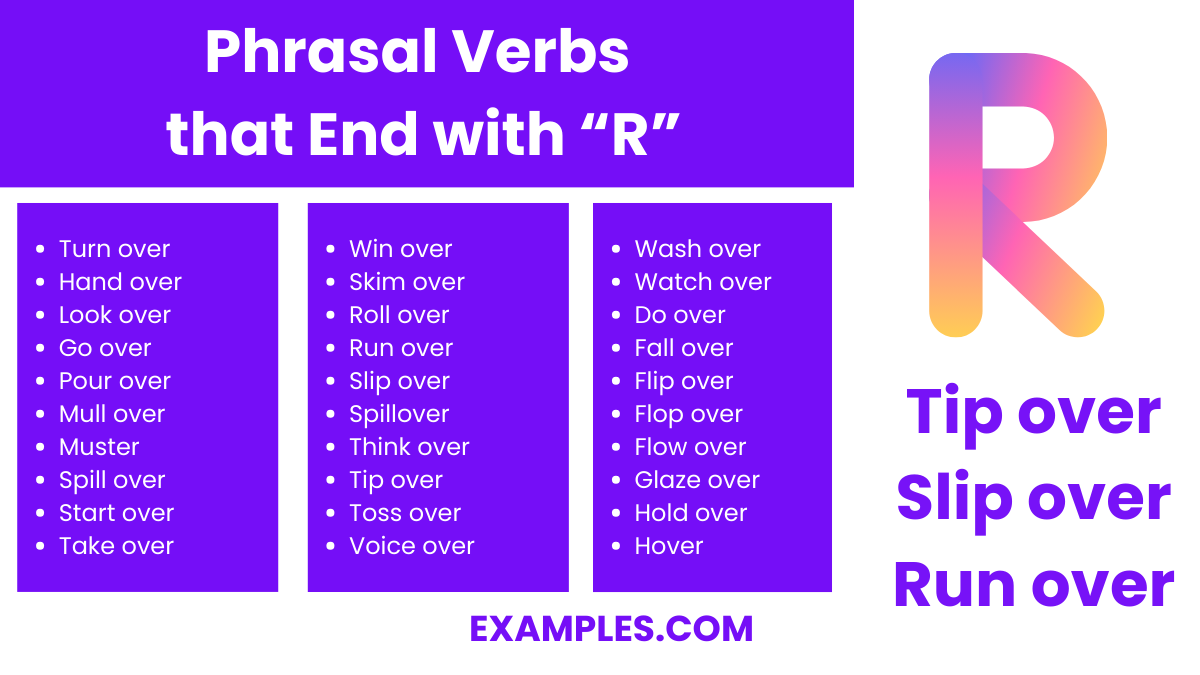
Phrasal verbs that conclude with ‘R’ add a distinctive flair to English, especially in casual and spoken forms. Comprising a verb coupled with a preposition or adverb, these phrasal verbs diverge in meaning from their base verbs, offering richer expressive possibilities. They are essential for achieving fluency and bringing vibrancy to communication. This article highlights 30 such phrasal verbs ending in ‘R,’ serving as a valuable resource for educators seeking to deepen their and their students’ linguistic proficiency. By integrating these into the curriculum, teachers can make learning more engaging and reflective of real-life language use. Emphasizing Consonant Words in this context sharpens phonetic skills, while Pictionary Words introduce a creative, visual aspect to language learning, making this compilation an effective tool for comprehensive language education.
- Turn over – To flip something to the other side.
- Hand over – To give control or possession to someone.
- Look over – To examine or review.
- Go over – To review or check.
- Pour over – To study something intensely.
- Mull over – To think deeply about something.
- Muster – To gather or summon.
- Spill over – To overflow or extend beyond limits.
- Start over – To begin again.
- Take over – To assume control of something.
- Win over – To gain the support or favor of someone.
- Skim over – To read or glance through quickly.
- Roll over – To turn completely in a circle or to defer.
- Run over – To hit with a vehicle; also, to rehearse.
- Slip over – To put on a garment easily.
- Spillover – An effect that spreads out from a specific source.
- Think over – To consider carefully.
- Tip over – To overturn or topple.
- Toss over – To throw something casually.
- Voice over – To narrate or dub.
- Wash over – To overwhelm emotionally.
- Watch over – To guard or protect.
- Do over – To redo or repeat.
- Fall over – To collapse or topple.
- Flip over – To reverse the position.
- Flop over – To fall or hang limply.
- Flow over – To overflow.
- Glaze over – To become unfocused (used for eyes).
- Hold over – To postpone or delay.
- Hover – To remain in one place in the air.
Describing Words That End with “R”

In the realm of English vocabulary, describing words, or adjectives, play a pivotal role. They bring color and clarity to our sentences, helping us convey precise meanings and emotions. A fascinating subset of these describing words are those that end with the letter ‘R.’ These adjectives offer a wide range of descriptions, from depicting qualities and states to indicating relationships or comparisons. For teachers and educators, understanding and teaching these words can greatly enhance students’ linguistic skills. Let’s explore 30 descriptive words ending in ‘R’ that can enrich our daily vocabulary and make learning English more engaging and effective.
- Brighter – More luminous or intelligent.
- Stronger – Having more strength or intensity.
- Quicker – Faster or more rapid.
- Sharper – Having a finer edge or intellect.
- Warmer – More affectionate or higher in temperature.
- Darker – Less illuminated or more somber.
- Slower – Moving at a reduced speed.
- Smaller – Lesser in size or amount.
- Greater – Larger in size or more significant.
- Bolder – More courageous or striking.
- Kinder – More compassionate or gentle.
- Wiser – Possessing more wisdom or knowledge.
- Calmer – More peaceful or tranquil.
- Louder – Producing more sound or noise.
- Finer – Of higher quality or more delicate.
- Braver – More courageous or fearless.
- Newer – More recent or updated.
- Leaner – Having less fat or more efficient.
- Richer – Wealthier or more abundant.
- Clearer – Easier to understand or more transparent.
- Younger – Of a lesser age.
- Sweeter – Having a more pleasing taste or disposition.
- Taller – Having greater height.
- Older – More advanced in age.
- Nicer – More pleasant or agreeable.
- Cooler – Lower in temperature or more stylish.
- Faster – Moving at a higher speed.
- Duller – Less sharp or less interesting.
- Fairer – More just or light in color.
- Poorer – Having less wealth or lower quality.
SAT Words That End with “R”
For educators and students preparing for the SAT, enhancing vocabulary is crucial. An interesting category of SAT words includes those that end with the letter ‘R.’ These words are not only pivotal for test success but also enrich everyday language. Mastering such vocabulary can significantly improve comprehension and expression, both in written and oral communication. This collection is tailored for teachers aiming to broaden their students’ linguistic horizons.
- Arbiter – A person who settles a dispute or has ultimate authority in a matter.
- Banter – Playful and friendly exchange of teasing remarks.
- Candor – The quality of being open and honest; frankness.
- Demeanor – Outward behavior or bearing.
- Elixir – A magical or medicinal potion.
- Fervor – Intense and passionate feeling.
- Garner – Gather or collect (something, especially information or approval).
- Harbinger – A person or thing that announces or signals the approach of another.
- Infer – Deduce or conclude information from evidence and reasoning rather than explicit statements.
- Jocular – Fond of or characterized by joking; humorous or playful.
- Linger – Stay in a place longer than necessary because of a reluctance to leave.
- Nadir – The lowest point in the fortunes of a person or organization.
- Ponder – Think about (something) carefully, especially before making a decision.
- Quiver – Tremble or shake with a slight rapid motion.
- Reverber – Echo repeatedly; resound.
- Simper – Smile or gesture in an affectedly coquettish, coy, or ingratiating manner.
- Tether – Tie (an animal) with a rope or chain so as to restrict its movement.
- Vigor – Physical strength and good health.
- Waiver – An act or instance of waiving a right or claim.
- Wander – Walk or move in a leisurely or aimless way.
- Usurper – A person who takes a position of power or importance illegally or by force.
- Quiver – To shake or move with a slight trembling motion.
- Plunder – Steal goods from (a place or person), typically using force and in a time of war or civil disorder.
Perspective Words that End with “R”
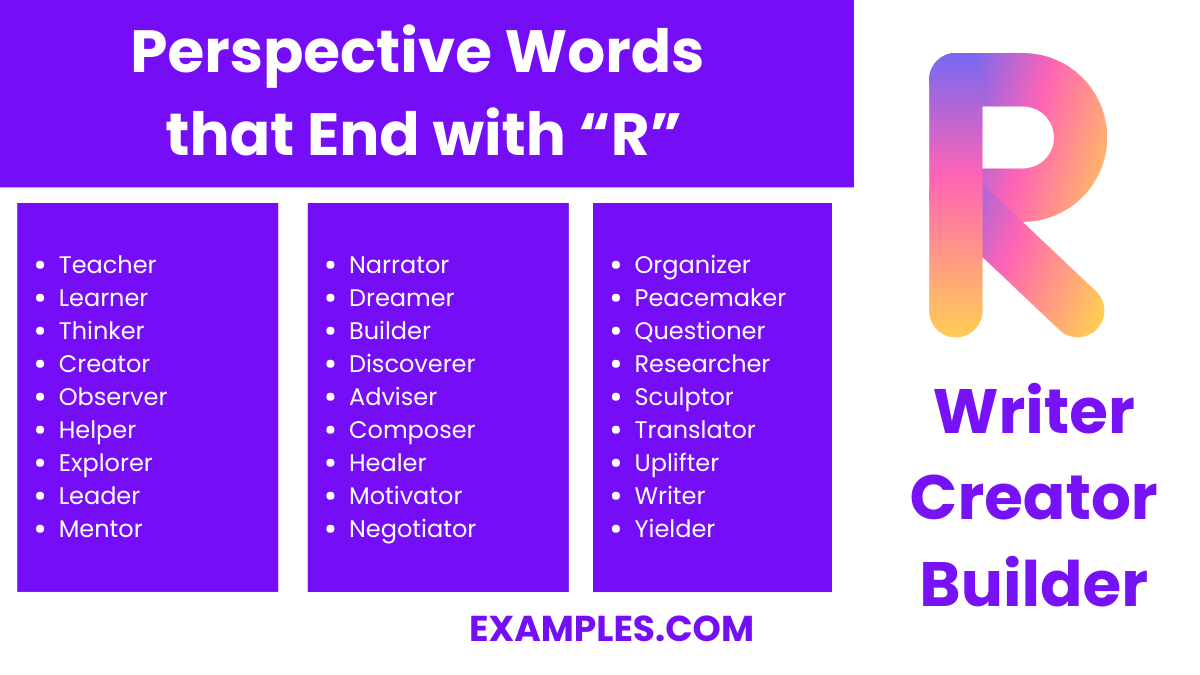
The exploration of words ending in ‘R’ opens up a unique dimension in language learning, offering insights that enhance our communicative abilities. These words, often reflective of actions, states, or roles, are valuable tools for both educators and students keen on deepening their linguistic understanding. They serve not only to convey thoughts more precisely but also to navigate the diverse perspectives within the English language. This compilation of 30 perspective-rich words ending in ‘R,’ complete with definitions, is an essential resource for educational environments, fostering a more nuanced comprehension and articulate expression. Incorporating Funny Words into this exploration adds an element of humor and engagement, making the learning process more enjoyable and relatable.
- Teacher – A person who educates or instructs.
- Learner – Someone who is acquiring knowledge or skills.
- Thinker – An individual who uses reasoning and intellect.
- Creator – A person who brings something into existence.
- Observer – One who watches or notices something.
- Helper – Someone who provides assistance or support.
- Explorer – A person who investigates or travels to new areas.
- Innovator – An individual who introduces new methods or ideas.
- Leader – Someone who guides or directs a group.
- Mentor – A wise and trusted counselor or teacher.
- Narrator – A person who tells a story or gives an account of something.
- Dreamer – An individual who envisions or imagines possibilities.
- Builder – Someone who constructs or develops something.
- Discoverer – A person who finds or uncovers something.
- Adviser – An individual who gives guidance or recommendations.
- Composer – Someone who writes music.
- Empowerer – A person who gives others power or authority.
- Healer – An individual skilled in curing ailments or restoring health.
- Motivator – Someone who inspires others to act or achieve.
- Negotiator – A person skilled in discussion aimed at reaching an agreement.
- Organizer – An individual who arranges or structures something.
- Peacemaker – Someone who promotes harmony and resolves conflicts.
- Questioner – A person who asks questions to gain information.
- Researcher – An individual who conducts systematic investigation.
- Sculptor – Someone who shapes or carves materials into artworks.
- Translator – A person who converts text or speech into another language.
- Uplifter – An individual who boosts morale or spirits.
- Writer – A person who composes written material.
- Yielder – An individual who produces or gives way under pressure.
Short Words That End with “R”
The English language is a fascinating puzzle of letters and sounds. Among its many pieces are short words ending with ‘R’ – small yet mighty components that add rhythm and clarity to our speech and writing. For teachers and educators, understanding these words is crucial, as they frequently appear in texts and conversations. They are the building blocks for students learning English, aiding in the development of reading, writing, and comprehension skills. This article provides a curated list of short words ending with ‘R’ along with their meanings, serving as a valuable resource for teachers who aim to enhance their students’ linguistic abilities.
- Air – The invisible gaseous substance surrounding the earth.
- Bar – A long rod or rigid piece of wood, metal, or similar material.
- Car – A road vehicle, typically with four wheels, powered by an internal combustion engine.
- Ear – The organ of hearing and balance in humans and other vertebrates.
- Far – At, to, or by a great distance.
- Jar – A wide-mouthed, cylindrical container made of glass or pottery.
- Nor – Used to introduce an added statement, usually something that is different from what you have said.
- Our – Belonging to or associated with the speaker and one or more other people.
- Per – For each; for every.
- Sir – A formal and polite way of speaking to a man.
- War – A state of armed conflict between different countries or different groups within a country.
- Her – Used as the object of a verb or preposition to refer to a female person or animal previously mentioned or easily identified.
- Fur – The short, fine, soft hair of certain animals.
- Mar – Impair the quality or appearance of; spoil.
- Tar – A dark, thick, flammable liquid distilled from wood or coal, used in road surfacing and roofing.
- Dor – A European dung beetle.
- Yar – (Nautical) Quick and agile; lively.
- Tor – A high rock or pile of rocks on the top of a hill.
- Par – The number of strokes a first-class player should normally require for a particular hole or course.
- Oar – A pole with a flat blade, pivoting in an oar lock, used to row or steer a boat through the water.
In conclusion, words ending with ‘R’ are pivotal in crafting expressive and precise language. For effective teaching and learning, it’s important to understand their meanings and applications. Encourage students to practice using these words in sentences and recognize their roles in various contexts. This approach not only broadens vocabulary but also sharpens linguistic skills, essential for mastering the English language.


